 We are pleased to inform you that we will be attending the 51st Historikertag in Hamburg, Germany from 20th-23rd September, 2016. Please stop by our stand, HOF15, to browse our latest selection of titles at discounted prices and pick up some free journal samples.
We are pleased to inform you that we will be attending the 51st Historikertag in Hamburg, Germany from 20th-23rd September, 2016. Please stop by our stand, HOF15, to browse our latest selection of titles at discounted prices and pick up some free journal samples.
If you are unable to attend, we would like to provide you with a special discount offer. For the next 30 days, receive a 25% discount on all History titles found on our website. At checkout, simply enter the code HTAG16.
To browse our latest History titles, please see our 2016 History Catalogue or visit our website for a complete listing of all published and forthcoming titles.
Below is a preview of some of our newest releases on display.
NEW
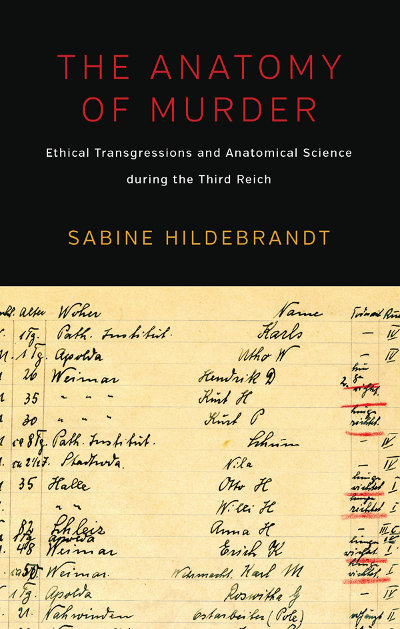 THE ANATOMY OF MURDER
THE ANATOMY OF MURDER
Ethical Transgressions and Anatomical Science during the Third Reich
Sabine Hildebrandt
Foreword by William E. Seidelman
Of the many medical specializations to transform themselves during the rise of National Socialism, anatomy has received relatively little attention from historians. While politics and racial laws drove many anatomists from the profession, most who remained joined the Nazi party, and some helped to develop the scientific basis for its racialist dogma. As historian and anatomist Sabine Hildebrandt reveals, however, their complicity with the Nazi state went beyond the merely ideological. They progressed through gradual stages of ethical transgression, turning increasingly to victims of the regime for body procurement, as the traditional model of working with bodies of the deceased gave way, in some cases, to a new paradigm of experimentation with the “future dead.”
Read Introduction
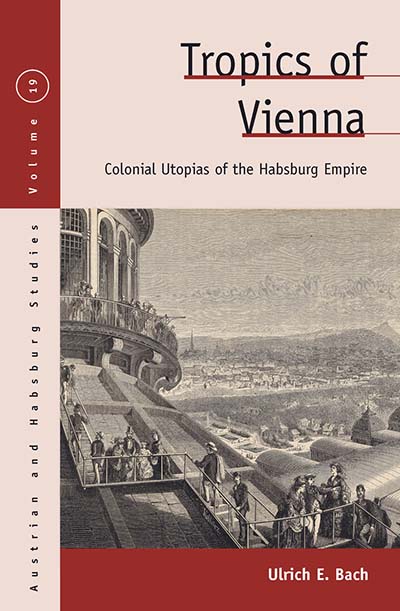 TROPICS OF VIENNA
TROPICS OF VIENNA
Colonial Utopias of the Habsburg Empire
Ulrich E. Bach
Volume 19, Austrian and Habsburg Studies
The Austrian Empire was not a colonial power in the sense that fellow actors like 19th-century England and France were. It nevertheless oversaw a multinational federation where the capital of Vienna was unmistakably linked with its eastern periphery in a quasi-colonial arrangement that inevitably shaped the cultural and intellectual life of the Habsburg Empire. This was particularly evident in the era’s colonial utopian writing, and Tropics of Vienna blends literary criticism, cultural theory, and historical analysis to illuminate this curious genre. By analyzing the works of Leopold von Sacher-Masoch, Theodor Herzl, Joseph Roth, and other representative Austrian writers, it reveals a shared longing for alternative social and spatial configurations beyond the concept of the “nation-state” prevalent at the time.
Read Introduction
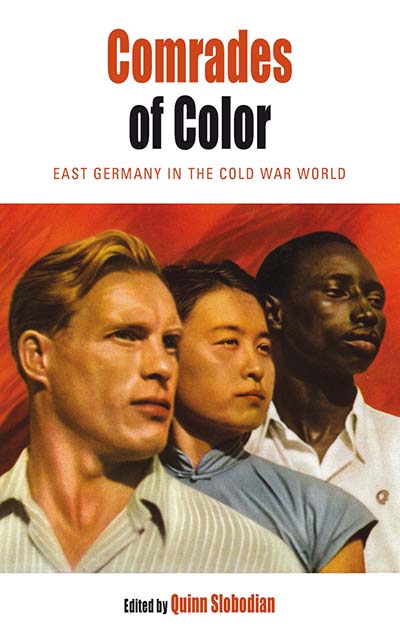 COMRADES OF COLOR
COMRADES OF COLOR
East Germany in the Cold War World
Edited by Quinn Slobodian
Volume 15, Protest, Culture & Society
In keeping with the tenets of socialist internationalism, the political culture of the German Democratic Republic strongly emphasized solidarity with the non-white world: children sent telegrams to Angela Davis in prison, workers made contributions from their wages to relief efforts in Vietnam and Angola, and the deaths of Patrice Lumumba, Ho Chi Minh, and Martin Luther King, Jr. inspired public memorials. Despite their prominence, however, scholars have rarely examined such displays in detail. Through a series of illuminating historical investigations, this volume deploys archival research, ethnography, and a variety of other interdisciplinary tools to explore the rhetoric and reality of East German internationalism.
Read Introduction
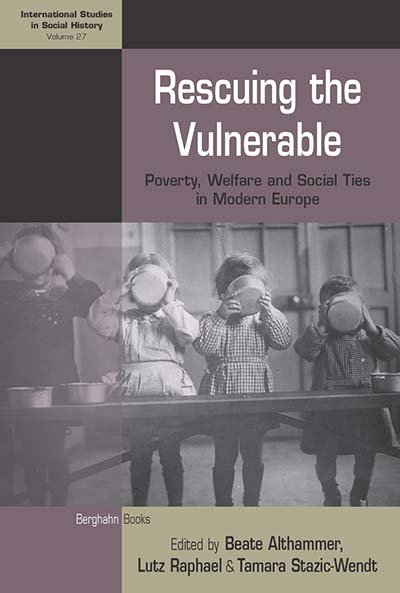 RESCUING THE VULNERABLE
RESCUING THE VULNERABLE
Poverty, Welfare and Social Ties in Modern Europe
Edited by Beate Althammer, Lutz Raphael, and Tamara Stazic-Wendt
Volume 27, International Studies in Social History
In many ways, the European welfare state constituted a response to the new forms of social fracture and economic turbulence that were born out of industrialization—challenges that were particularly acute for groups whose integration into society seemed the most tenuous. Covering a range of national cases, this volume explores the relationship of weak social ties to poverty and how ideas about this relationship informed welfare policies in the nineteenth and twentieth centuries. By focusing on three representative populations—neglected children, the homeless, and the unemployed—it provides a rich, comparative consideration of the shifting perceptions, representations, and lived experiences of social vulnerability in modern Europe.
Read Introduction: Poverty and Endangered Social Ties: An Introduction
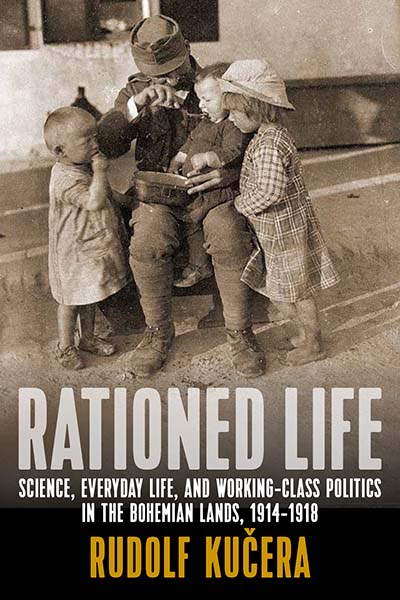 RATIONED LIFE
RATIONED LIFE
Science, Everyday Life, and Working-Class Politics in the Bohemian Lands, 1914–1918
Rudolf Kučera
Far from the battlefront, hundreds of thousands of workers toiled in Bohemian factories over the course of World War I, and their lives were inescapably shaped by the conflict. In particular, they faced new and dramatic forms of material hardship that strained social ties and placed in sharp relief the most mundane aspects of daily life, such as when, what, and with whom to eat. This study reconstructs the experience of the Bohemian working class during the Great War through explorations of four basic spheres—food, labor, gender, and protest—that comprise a fascinating case study in early twentieth-century social history.
Read Introduction
 LOBBYING HITLER
LOBBYING HITLER
Industrial Associations between Democracy and Dictatorship
Matt Bera
From 1933 onward, Nazi Germany undertook massive and unprecedented industrial integration, submitting an entire economic sector to direct state oversight. This innovative study explores how German professionals navigated this complex landscape through the divergent careers of business managers in two of the era’s most important trade organizations. While Jakob Reichert of the iron and steel industry unexpectedly resisted state control and was eventually driven to suicide, Karl Lange of the machine builders’ association achieved security for himself and his industry by submitting to the Nazi regime. Both men’s stories illuminate the options available to industrialists under the Third Reich, as well as the real priorities set by the industries they served.
Read Introduction: Adaptation and Opposition in Democracy and Dictatorship
NEW IN PAPERBACK
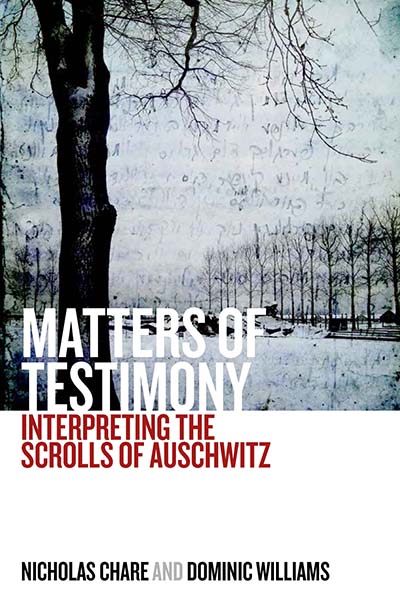
Forthcoming in Paperback!
MATTERS OF TESTIMONY
Interpreting the Scrolls of Auschwitz
Nicholas Chare and Dominic Williams
Check out Nicholas Chare and Dominic Williams’s piece on Slate’s The Vault and also Searching for Feelings: The Scrolls of Auschwitz and Son of Saul on the Berghahn Blog.
“This is a major book that changes the field. It is a brilliant and original work of superb historical research and profoundly affecting cultural analysis.” · Griselda Pollock, University of Leeds
In 1944, members of the Sonderkommando—the “special squads,” composed almost exclusively of Jewish prisoners, who ensured the smooth operation of the gas chambers and had firsthand knowledge of the extermination process—buried on the grounds of Auschwitz-Birkenau a series of remarkable eyewitness accounts of Nazi genocide. This careful and penetrating study examines anew these “Scrolls of Auschwitz,” which were gradually recovered, in damaged and fragmentary form, in the years following the camp’s liberation. It painstakingly reconstructs their historical context and textual content, revealing complex literary works that resist narrow moral judgment and engage difficult questions about the limits of testimony.
Read Introduction: Matters of Testimony
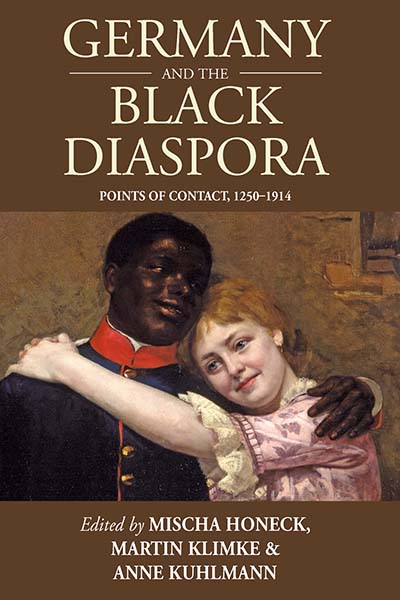 GERMANY AND THE BLACK DIASPORA
GERMANY AND THE BLACK DIASPORA
Points of Contact, 1250-1914
Edited by Mischa Honeck, Martin Klimke, and Anne Kuhlmann
Volume 15, Studies in German History
“In this exciting volume, Honeck, Klimke, and Kuhlmann put forward a unique resource for the burgeoning study of the African diaspora in Germany. Comprising essaysf rom scholars working in a variety of fields, the collection fills significant gaps in the current scholarship… In detailing a phenomenon long ignored within mainstream German culture and history, this collection will be of use to a variety of readers, including those working in African and African American studies, art history, German studies, and history…Highly recommended.” · Choice
The rich history of encounters prior to World War I between people from German-speaking parts of Europe and people of African descent has gone largely unnoticed in the historical literature—not least because Germany became a nation and engaged in colonization much later than other European nations. This volume presents intersections of Black and German history over eight centuries while mapping continuities and ruptures in Germans’ perceptions of Blacks. The contributors present a wide range of Black–German encounters, from representations of Black saints in religious medieval art to Black Hessians fighting in the American Revolutionary War, from Cameroonian children being educated in Germany to African American agriculturalists in Germany’s protectorate, Togoland.
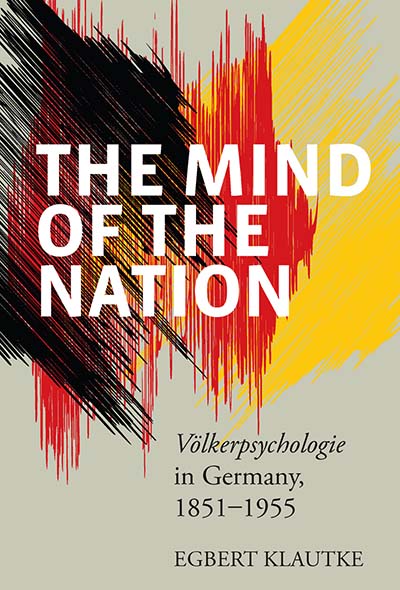 THE MIND OF THE NATION
THE MIND OF THE NATION
Völkerpsychologie in Germany, 1851-1955
Egbert Klautke
“Klautke provides readers both with useful biographical summaries and with cogent accounts of his protagonists’ specific interpretations of Völkerpsychologie. But he also expands his narrative horizon beyond mere intellectual biography. Laudably, he pays special attention to the broader reception of their writings in an attempt to correct the misperception that Völkerpsychologie was merely ‘political propaganda dressed up as a social science’.” · German History
Völkerpsychologie played an important role in establishing the social sciences via the works of such scholars as Georg Simmel, Emile Durkheim, Ernest Renan, Franz Boas, and Werner Sombart. In Germany, the intellectual history of “folk psychology” was represented by Moritz Lazarus, Heymann Steinthal, Wilhelm Wundt and Willy Hellpach. This book follows the invention of the discipline in the nineteenth century, its rise around the turn of the century and its ultimate demise after the Second World War.
Read Introduction: Völkerpsychologie in Germany
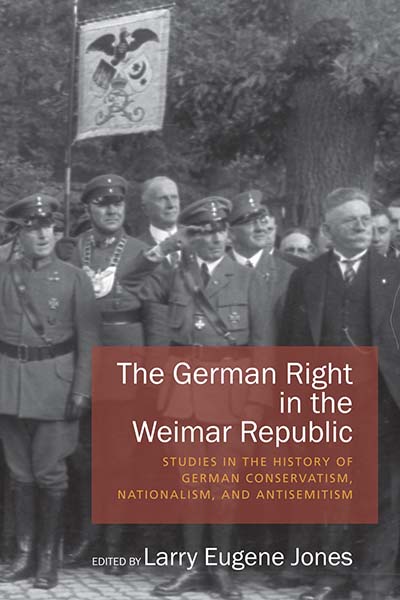 THE GERMAN RIGHT IN THE WEIMAR REPUBLIC
THE GERMAN RIGHT IN THE WEIMAR REPUBLIC
Studies in the History of German Conservatism, Nationalism, and Antisemitism
Edited by Larry Eugene Jones
“The strength of this collection is its engagement with this ideological and institutional diversity… Though not intended for general readers (who will find relatively little about Hitler and the Nazis here), specialists will benefit from this volume’s exploration of the ideas that shaped the German Right and the ways that their spokesmen negotiated their ideological differences during a period of profound societal crisis.” · Choice
The German Right in the Weimar Republic examines the role that the German Right played in the destabilization and overthrow of the Weimar Republic, with particular emphasis on the political and organizational history of Rightist groups as well as on the many permutations of right-wing ideology during the period. In particular, antisemitism and the so-called “Jewish Question” played a prominent role in the self-definition and politics of the right-wing groups and ideologies explored by the contributors to this volume.
Read Introduction: The German Right in the Weimar Republic: New Directions, New Insights, New Challenges
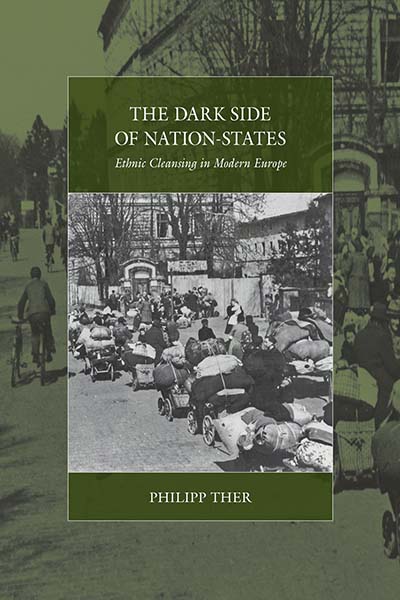 THE DARK SIDE OF NATION-STATES
THE DARK SIDE OF NATION-STATES
Ethnic Cleansing in Modern Europe
Philipp Ther
Volume 19, War and Genocide
“This is a very fine book worthy of wide scholarly attention. Unlike most other scholars, who see genocide and ethnic cleansing as closely interrelated, Philipp Ther emphasizes the differences between them… I admire its clarity and succinctness and the mastery of a vast material demonstrated by its author. His erudition and courage let him make new and surprising connections and offer truly illuminating insights.” · Slavic Review
Almost all mass-scale population removals were rationally and precisely organized and carried out in cold blood, with revenge, hatred and other strong emotions playing only a minor role. This book not only considers the majority of population removals which occurred in Eastern Europe, but is also an encompassing, comparative study including Western Europe, interrogating the motivations of Western statesmen and their involvement in large-scale population removals. It also reaches beyond the European continent and considers the reverberations of colonial rule and ethnic cleansing in the former British colonies.
Read Introduction
 WHAT IS HISTORY FOR?
WHAT IS HISTORY FOR?
Johann Gustav Droysen and the Functions of Historiography
Arthur Alfaix Assis
Volume 17, Making Sense of History
“Assis offers the reader a wide panorama of German historiography during the nineteenth century, centering on the debates about historicism, a dominant paradigm for German historical knowledge in the nineteenth century, and in the reformulation of pragmatic value for historiography. Arthur Assis’ work is therefore not only directed at specialists or at researchers of Droysen’s work, but at all those who study German and general historiography, intellectual history, and even political historiography, since it highlights the political influences of Droysen’s thought.” · Revista Brasileira de História
A scholar of Hellenistic and Prussian history, Droysen developed a historical theory that at the time was unprecedented in range and depth, and which remains to the present day a valuable key for understanding history as both an idea and a professional practice. Arthur Alfaix Assis interprets Droysen’s theoretical project as an attempt to redefine the function of historiography within the context of a rising criticism of exemplar theories of history, and focuses on Droysen’s claim that the goal underlying historical writing and reading should be the development of the subjective capacity to think historically.
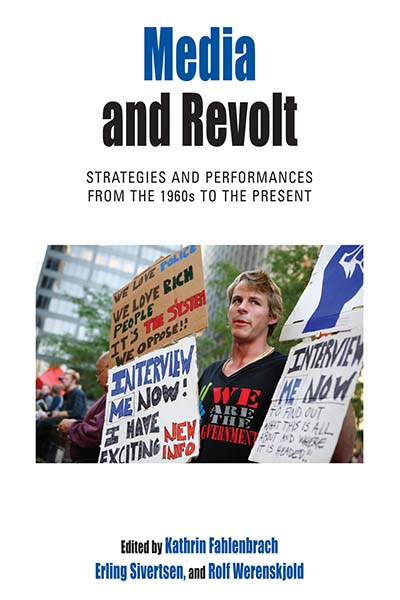 MEDIA AND REVOLT
MEDIA AND REVOLT
Strategies and Performances from the 1960s to the Present
Edited by Kathrin Fahlenbrach, Erling Sivertsen & Rolf Werenskjold
Volume 11, Protest, Culture & Society
”…a timely, truly interdisciplinary, and much needed volume on the relationship between (mass) media, social movements and protests.” · Peter N. Funke, University of South Florida
In what ways have social movements attracted the attention of the mass media since the sixties? How have activists influenced public attention via visual symbols, images, and protest performances in that period? And how do mass media cover and frame specific protest issues? Drawing on contributions from media scholars, historians, and sociologists, this volume explores the dynamic interplay between social movements, activists, and mass media from the 1960s to the present. It introduces the most relevant theoretical approaches to such issues and offers a variety of case studies ranging from print media, film, and television to Internet and social media.
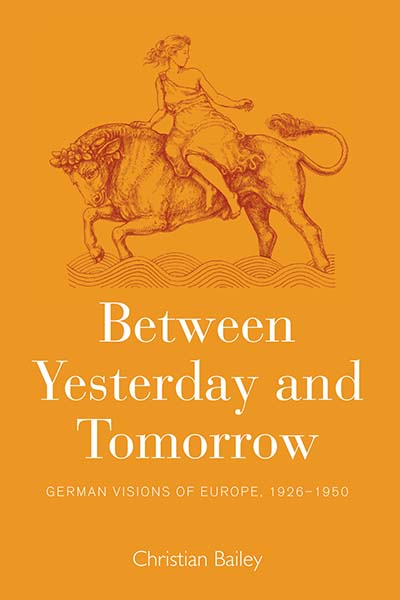 BETWEEN YESTERDAY AND TOMORROW
BETWEEN YESTERDAY AND TOMORROW
German Visions of Europe, 1926-1950
Christian Bailey
“Bailey’s book opens long-term perspectives, and offers a thorough analysis of selected non-dominant ideas about Europe in Germany in the 1940s and 1950s.” · European History Quarterly
An intellectual and cultural history of mid-twentieth century plans for European integration, this book calls into question the usual pre- and post-war periodizations that have structured approaches to twentieth-century European history. It focuses not simply on the ideas of leading politicians but analyses debates about Europe in “civil society” and the party-political sphere in Germany, asking if, and how, a “permissive consensus” was formed around the issue of integration. Taking Germany as its case study, the book offers context to the post-war debates, analysing the continuities that existed between interwar and post-war plans for European integration. It draws attention to the abiding scepticism of democracy displayed by many advocates of integration, indeed suggesting that groups across the ideological spectrum converged around support for European integration as a way of constraining the practice of democracy within nation-states.
Read Introduction
 MIGRATION, SETTLEMENT AND BELONGING IN EUROPE, 1500-1930S
MIGRATION, SETTLEMENT AND BELONGING IN EUROPE, 1500-1930S
Comparative Perspectives
Edited by Steven King and Anne Winter
Volume 23, International Studies in Social History
“…a valuable and engaging contribution to historical debates about labor, poverty, relief, and belonging…[The papers] are written by leaders in their fields…and pulled together [by the editors] in an elegant and convincing treatment of the case for such a geographical spread.” · Alannah Tomkins, University of Keele
This volume offers a pan-European survey that encompasses Switzerland, Prussia, Belgium, the Netherlands, and Britain. It explores how the conception of belonging changed over time and space from the 1500s onwards, how communities dealt with the welfare expectations of an increasingly mobile population that migrated both within and between states, the welfare rights that were attached to those who “belonged,” and how ordinary people secured access to welfare resources.
Read Introduction: Settlement and Belonging in Europe, 1600-1950: Structures, Negotiations and Experiences
BERGHAHN JOURNALS



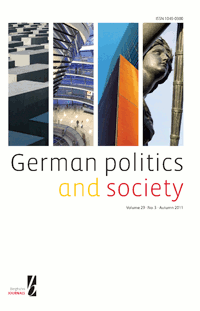

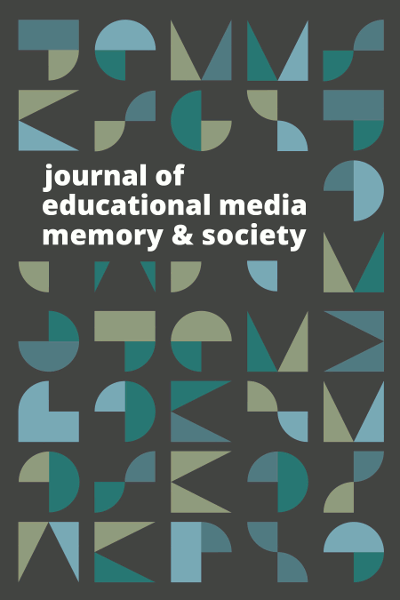
Aspasia
The International Yearbook of Central, Eastern, and Southeastern European Women’s and Gender History
Aspasia is the international peer-reviewed annual of women’s and gender history of Central, Eastern, and Southeastern Europe (CESEE). It aims to transform European women’s and gender history by expanding comparative research on women and gender to all parts of Europe, creating a European history of women and gender that encompasses more than the traditional Western European perspective.
Contributions to the History of Concepts
Contributions to the History of Concepts is the international peer-reviewed journal of the History of Concepts Group (formerly HPSCG). The journal serves as a platform for theoretical and methodological articles as well as empirical studies on the history of concepts and their social, political, and cultural contexts.
French Politics, Culture & Society
FPC&S is the journal of the Conference Group on French Politics & Society. FPC&S explores modern and contemporary France from the perspectives of the social sciences, history, and cultural analysis. It also examines France’s relationship to the larger world, especially Europe, the United States, and the former French Empire.
GPS is a joint publication of the BMW Center for German and European Studies (of the Edmund A. Walsh School of Foreign Service, Georgetown University) and the German Academic Exchange Service (DAAD). The journal provides a forum for critical analysis and debate about politics, history, film, literature, visual arts, and popular culture in contemporary Germany.
Historical Reflections/Réflexions Historiques
HRRH has established a well-deserved reputation for publishing high quality articles of wide-ranging interest for over forty years. The journal, which publishes articles in both English and French, is committed to exploring history in an interdisciplinary framework and with a comparative focus.
Journal of Educational Media, Memory, and Society
JEMMS explores perceptions of society as constituted and conveyed in processes of learning and educational media. The focus is on various types of texts (such as textbooks, museums, memorials, films) and their institutional, political, social, economic, and cultural contexts. The construction of collective memory and conceptions of space, the production of meaning, image formation, forms of representation, and perceptions of the “self” and the “other,” as well as processes of identity construction (ethnic, national, regional, religious, institutional, gender) are of particular interest.
